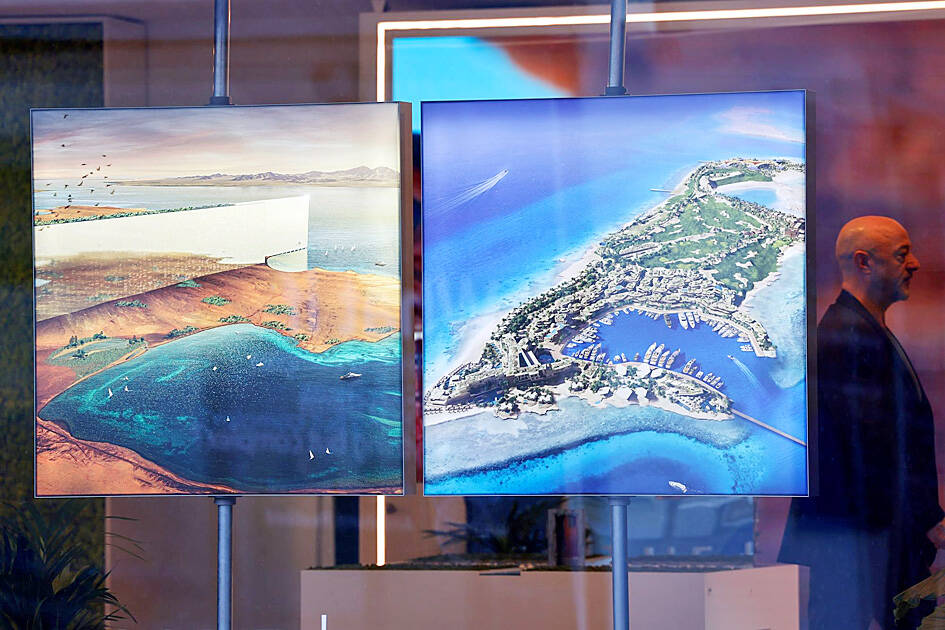Oracle Corp plans to invest US$1.5 billion in Saudi Arabia in the coming years as it builds up its cloud footprint in the kingdom and opens its third public cloud region in Riyadh, a company official said.
Increased demand for cloud computing has pushed technology companies such as Oracle, Microsoft Corp, Amazon.com Inc and Alphabet Inc’s Google to set up data centers across the world to speed up data transfer.
Saudi officials have pressed international companies to invest in the kingdom and move their regional headquarters to Riyadh to benefit from government contracts.

Photo: Bloomberg
“We are finalizing the plans for opening the Riyadh region. We are still working with our suppliers before we can announce the actual date,” Oracle senior vice president Nick Redshaw said.
The investment would be made over several years, Redshaw said, adding that Oracle would also expand the capacity of its cloud region in Jeddah, which the company opened in 2020.
The company made the announcement as global tech companies gathered for a major tech conference in the Saudi capital.
Alhough Oracle lags behind its bigger rivals in the race to corner the cloud computing market, it was among the first large tech companies to open a data center in Saudi Arabia.
The kingdom has devoted hundreds of billions of US dollars toward an economic transformation, known as Vision 2030, led by Saudi Crown Prince Mohammed bin Salman.
However, it has struggled to attract foreign direct investment, one of the pillars of Vision 2030, which aims at diversifying the economy away from oil.
Foreign direct investment reached just under US$4.1 billion in the first half of last year, a fraction of the ambitious US$100 billion target set for the end of this decade.
While Oracle has been working with the government, Saudi Arabia has been trying to encourage foreign firms to set up headquarters in the country or risk losing out on government contracts — deals that would be available until the end of this year.
“We are working closely with the Saudi government to finalize plans for that regional headquarters requirement, and we will announce them as we finalize that with them,” Redshaw said.
Oracle has also won contracts from the crown prince’s US$500 billion flagship NEOM project, a futuristic megacity and economic zone that is being built on the Red Sea coast.
NEOM is one of Oracle’s largest consumers of cloud capability in Saudi Arabia, Redshaw said.

BYPASSING CHINA TARIFFS: In the first five months of this year, Foxconn sent US$4.4bn of iPhones to the US from India, compared with US$3.7bn in the whole of last year Nearly all the iPhones exported by Foxconn Technology Group (富士康科技集團) from India went to the US between March and last month, customs data showed, far above last year’s average of 50 percent and a clear sign of Apple Inc’s efforts to bypass high US tariffs imposed on China. The numbers, being reported by Reuters for the first time, show that Apple has realigned its India exports to almost exclusively serve the US market, when previously the devices were more widely distributed to nations including the Netherlands and the Czech Republic. During March to last month, Foxconn, known as Hon Hai Precision Industry

Taiwan Semiconductor Manufacturing Co (TSMC, 台積電) and the University of Tokyo (UTokyo) yesterday announced the launch of the TSMC-UTokyo Lab to promote advanced semiconductor research, education and talent development. The lab is TSMC’s first laboratory collaboration with a university outside Taiwan, the company said in a statement. The lab would leverage “the extensive knowledge, experience, and creativity” of both institutions, the company said. It is located in the Asano Section of UTokyo’s Hongo, Tokyo, campus and would be managed by UTokyo faculty, guided by directors from UTokyo and TSMC, the company said. TSMC began working with UTokyo in 2019, resulting in 21 research projects,

Taiwan’s property market is entering a freeze, with mortgage activity across the nation’s six largest cities plummeting in the first quarter, H&B Realty Co (住商不動產) said yesterday, citing mounting pressure on housing demand amid tighter lending rules and regulatory curbs. Mortgage applications in Taipei, New Taipei City, Taoyuan, Taichung, Tainan and Kaohsiung totaled 28,078 from January to March, a sharp 36.3 percent decline from 44,082 in the same period last year, the nation’s largest real-estate brokerage by franchise said, citing data from the Joint Credit Information Center (JCIC, 聯徵中心). “The simultaneous decline across all six cities reflects just how drastically the market

Ashton Hall’s morning routine involves dunking his head in iced Saratoga Spring Water. For the company that sells the bottled water — Hall’s brand of choice for drinking, brushing his teeth and submerging himself — that is fantastic news. “We’re so thankful to this incredible fitness influencer called Ashton Hall,” Saratoga owner Primo Brands Corp’s CEO Robbert Rietbroek said on an earnings call after Hall’s morning routine video went viral. “He really helped put our brand on the map.” Primo Brands, which was not affiliated with Hall when he made his video, is among the increasing number of companies benefiting from influencer